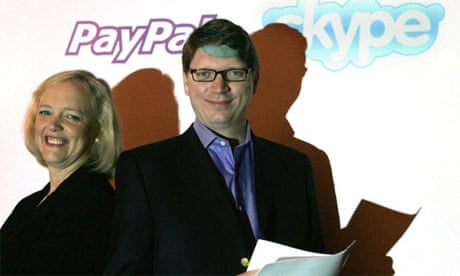The founders of Skype have regained a significant stake in the internet company after settling a contentious legal dispute that had threatened to derail its $2bn sale.
The deal, which was announced today, will give Niklas Zennstrom and Janus Friis a 14% stake in the internet telephony service they originally sold to auction website eBay in 2005 for $2.6bn.
Confirmation that the duo had settled their court action - which focused on the ownership of a core technology used by Skype to deliver millions of voice and video calls over the internet - means the duo have now regained around $400m of shares in the company.
"This is fantastic news for us, clearing the road ahead and making what was shaping up to be an exciting journey, an unbelievable journey," said Skype chief executive Josh Silverman.
The agreement finally brings to an end an increasingly fractious argument over the future of Skype that even led eBay to suggest at one point that the service could be shut down entirely.
The fracas began earlier this year, when Zennstrom and Friis tried to end a licensing to a technology they created called Global Index, which was part of the system that underpins Skype's popular online calling services. The duo had retained the rights to Global Index when they sold the company to eBay in 2005 - a surprise twist in the deal that shocked industry observers when it was revealed in court filings.
The dispute continued through the summer as the two groups argued over the details of the licensing arrangement, but things came to a head in September when eBay announced its plan to spin off Skype and sell two-thirds of it to a consortium of investors for $1.9bn.
While the move itself was not unexpected - eBay had consistently struggled to integrate Skype with its core internet auction business - the nature of the sell-off apparently angered Zennstrom and Friis. Shortly after the sale was announced, they launched a fresh series of legal attacks, targeting both eBay and the proposed buyers.
In particular, they focused on the involvement of London-based investment group Index Ventures and former Cisco executive Mike Volpi, who had been lined up to take charge of Skype under its new owners.
The Scandinavian duo alleged that Index and Volpi were planning to use inside information on the way Global Index worked to avoid the licensing dispute. Volpi had previously been chairman of video startup Joost, another company started by Zennstrom and Friis that used the system.
As a result of today's agreement with eBay, Index and Volpi will drop their involvement in the deal in favour of Zennstrom and Friis. The other investors - including private investment group Silver Lake and recently-launched venture capital firm led by Netscape founder Marc Andreessen - will continue their part in the purchase.
Skype will also gain ownership of the software that was previously licensed, ending any possibility of further confusion or litigation in th future.
Details of the agreement had been widely reported ahead of the announcement, but executives said it was a relief to have finally ended the arguments over Skype's future.
"We are very pleased to have the litigation resolved," said Silver Lake managing director Egon Durban. "We remain confident in a great future for Skype and we look forward to working with Niklas, Janus and the other investors as partners to help the company achieve its full potential."
The company's new owners will hope that it can put the problems behind it and focus on maximising profits now that it is freed from the constraint of being a division of a larger company.
"There was some drama along the way, but we came out with everybody in the same boat rowing in the same direction," investor Marc Andreessen told TechCrunch.

Comments (…)
Sign in or create your Guardian account to join the discussion